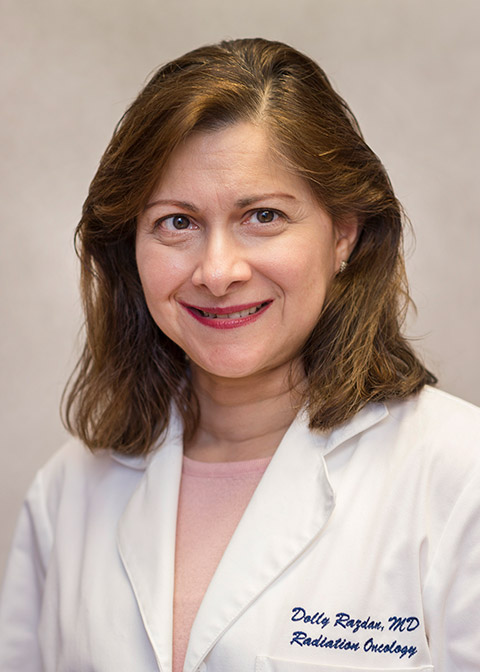
Maria J. Kowzun, MD, shares latest advancements in cancer treatment, from surgery to chemotherapy and radiation therapy.

In recognition of Breast Cancer Awareness Month in October, we thought it fitting to share some of the promising new drugs, radiation therapies, surgical techniques, clinical trials and advances in breast cancer diagnosis and treatment. Maria J. Kowzun, MD, Director of the Center for Breast Disease and Management at Clara Maass Medical Center (CMMC), shares more here.
Surgery
Many women diagnosed with breast cancer will need surgery as the first line of treatment. Most often, this surgery will be a mastectomy or lumpectomy; though the decision for surgery has not changed dramatically in recent years, Dr. Kowzun says the techniques have advanced to significantly improve the cosmetic outcomes of the surgery.
In terms of reconstructive or plastic surgery, however, there have been some notable changes.
A technique called Goldilocks Mastectomy is a relatively new option for women who either don’t want or are considered poor candidates for traditional reconstruction surgery.
“It is basically reconstruction without the need for any additional implants or tissue grafts,” Dr. Kowzun explains. In a Goldilocks Mastectomy, more skin is preserved than in a traditional mastectomy, and then the skin is used to create a small, contoured breast mound.
“It provides a little more breast contour or shape, but not as much as having an implant,” she explains. “We’ve been offering this option for the past few years for patients who would prefer not to have an implant or undergo a big reconstruction.”
Radiation Therapy
Radiation therapy is often recommended for women who have a lumpectomy, which preserves breast tissue, rather than a mastectomy. After a lumpectomy, radiation helps ensure that no cancer cells are left behind. Radiation oncologists continue to conduct new protocols to improve radiation doses and schedules. At Clara Maass Medical Center, Dolly Razdan, MD, serves as Medical Director of Radiation Oncology.

“Our radiation oncology specialists are currently working on something called hypofractionation,” says Dr. Kowzun. “It’s a treatment schedule that gives the same total dose of radiation as the usual treatment, but gives it in larger doses over a shorter time period. So, instead of having the radiation therapy over five or six weeks, it’s delivered in three to four weeks.”
Dr. Kowzun says that the department is trying to expand the eligibility criteria for this type of treatment so that more women can take advantage of it.
“It will be especially helpful for women with busy lives who live far away from a major treatment center,” she says.
According to Dr. Kowzun, her department is also involved in a clinical trial of preoperative boost radiation.
“Normally, standard radiation therapy is full-breast radiation,” she says. The “boost” radiation is extra treatment targeted specifically at the cancer site. Both types of radiation are usually given after breast cancer surgery.
“In the clinical trial, we’re trying to evaluate if we can successfully give the boost radiation before surgery and then give the rest of the full-breast radiation afterward,” says Dr. Kowzun.
She explains that the advantage of giving radiation this way is that before surgery, it’s easy to see where the cancer is and target it very precisely. But after surgery, the breast anatomy has been altered, and since it’s more difficult to direct the radiation exactly to where the cancer had been before it was removed, women wind up having a larger area of tissue irradiated.
“The goal is to provide less volume of radiation,” she explains.
Chemotherapy
Headlines last spring touted the impressive results of a clinical trial for the breast cancer drug trastuzumab deruxtecan (brand name Enhertu®). Previously used to treat only metastatic, treatment-resistant HER2-positive breast cancer—which affects only a small percentage of breast cancer patients—the clinical trial found that the drug was a promising treatment for most other breast cancers as well.
Patients on Enhertu, which is not yet FDA-approved for all breast cancers, lived an average of six months longer than those treated with conventional chemotherapy.
Clinical trials are the way physicians and scientists find new treatments that are both safe and effective. Patients at RWJBarnabas Health are fortunate to be able to participate in clinical trials, thanks to a partnership with Rutgers Cancer Institute of New Jersey, the state’s only National Cancer Institute-Designated Comprehensive Cancer Center.
“We have two breast cancer chemotherapy clinical trials in the works right now,” says Dr. Kowzun.
“The first is a neoadjuvant systemic therapy for HER2-positive breast cancer, for patients found to have residual disease after previous treatment.” According to Dr. Kowzun, “We’re evaluating new vaccines that target patients’ immune cells. We’re one of the only sites in the Northeast offering this trial.”
The other clinical trial is called ISPY-2. “It’s offered for patients with more locally advanced breast cancer,” says Dr. Kowzun. The goal of the ISPY- 2 trial is to try and personalize breast cancer treatment by identifying which new drugs currently in development will have the greatest effect on specific types of tumors when given before surgery.
To schedule a cancer screening at Clara Maass Medical Center, call 844-CANCERNJ (844-226-2376) .